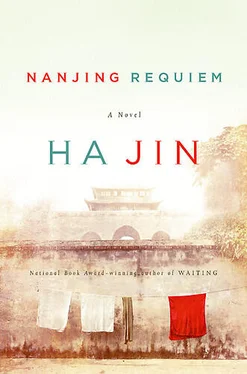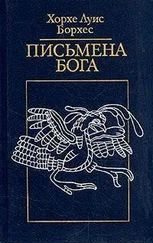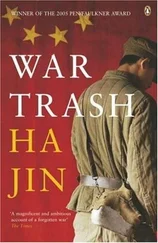On the afternoon of January 4, we set out for the Hsia Gwan station in a large car Minnie had borrowed from Lewis. She was at the wheel. I always admired her ability to do things most Chinese women couldn’t do: driving, cycling, playing ball games, keeping a dog, hiking. When we had pulled onto Ninghai Road, I reminded Minnie, “Remember when you said you’d teach me to drive?”
“I haven’t forgotten. Of course I’ll do that. When the war’s over, I’ll build my own house here and buy myself a little car.”
I was pleased to hear that. If only I could be as capable as she. A lot of people here regarded her as “a real man,” respecting her stately physique and her ability as a leader.
When we had passed Fujian Road and were approaching Yijiang Gate, we saw more houses leveled — the area was more desolate than it had been the previous winter. The site of the former Communications Ministry was now an immense compound fenced by barbwire, in which more than a dozen huge shacks stood as storehouses for military supplies. Along the way most of the deserted buildings had been torn down, the bricks and wood piled up ready to be shipped away. But the area near the train station was alive with people. Peddlers were hawking goods, while small shops lined the streets, offering soft drinks, fruit, snacks, cigarettes, and liquor. A handful of scalpers hung around the station, a three-story white building topped with a cupola and a spire, and were waving tickets at passersby.
All the trains ran on Tokyo time now, an hour behind China time. Inside the hall of the station, people were standing in two lines for tickets. One was short and only for Japanese passengers, while the other was long, with more than one hundred Chinese people waiting. At its end was Rulian. But the wicket at the head of the long line remained shut, and only the short line was moving. Near us stood a slim Japanese clerk in a blue uniform and a cap with a shiny black peak. We worried that Rulian and the girls might miss the train. Minnie went up to the man and said, “See those words?” She pointed at the slogan pasted above the front door, which declared in big characters: WE MUST UNITE TO BUILD A PROSPEROUS EAST ASIA!
The clerk nodded without speaking. Minnie continued, “Don’t you think the way you’re treating these Chinese passengers may contravene Japan’s policy and undermine the union of East Asia?”
He grinned knowingly, showing his tobacco-stained teeth, but he still said nothing. Then he slowly sauntered back into the office, and a minute later the other wicket opened, selling tickets to the Chinese in line.
Outside the windows a train pulled in, shuddering a little as it came to a stop and disgorged hundreds of passengers. The new arrivals didn’t have to wash their hands in Lysol or rinse their mouths with disinfectant anymore, and the guards frisked only two young men as they exited. Life was returning to normal, though the police still checked everyone’s papers.
Rulian came back with six train tickets and two platform tickets, and together we led the blind girls out of the hall. After checking in their baggage, we reached track 2; at the west end of the platform, about four hundred Japanese soldiers were lounging around, some lying on stretchers and some sitting on the ground paved with concrete slabs. A few men flailed their arms, groaning and shouting. Twenty or so young Japanese women — some in their late teens — moved among them, handing out rice cakes and water in canteens. A few fed the soldiers who were all bandaged up. Beyond them stood a sleeping car, in which some wounded officers were smoking and drinking tea, while others played cards. The windows of the car were partly fogged — it must be warm in there. Although the wounded men on the platform were cared for, to me they still looked like bundles of garbage scattered around in the glaring sunlight. The scene reminded me of the wounded Chinese soldiers I’d seen here just over a year ago. What a different sight this was. Yet these men were in some fashion similar to those Chinese men abandoned by their generals. Every one of them looked miserable, wasted, and aged.
Ahead of the sleeper for the officers stood three flatcars loaded with vehicles — trucks, sedans, ambulances, steamrollers, jeeps — waiting to be shipped to Japan. Now I understood why the Japanese confiscated automobiles driven by the Chinese.
The train to Shanghai came, and Rulian and the five blind girls got onto the third car. A window went up, through which they waved at us. Minnie stepped closer and said to them, “Take good care.”
“We’ll miss you,” one of the girls said, a catch in her voice.
I stepped over and touched their hands too. A locomotive whistled, panting heavily and crawling into the station on the other track. Before we could say more, a conductor shut the door and latched it with a clank; their train let out a long guttural hiss and a puff of vapor, then pulled away. Four hands, three small and one larger, reached out the window, waving. Minnie blew a kiss to them and I followed suit.
On our way back, we were drawn aside at Yijiang Gate because Minnie didn’t have her cholera certificate; without the papers, newcomers were not allowed to enter the city. An officer took her to a cabin nearby and ordered her to receive an inoculation. She protested, insisting that she was not a new arrival and had accidentally left her medical papers at her home inside the city. “Look,” she said to the man with a pimpled face, “I don’t have any baggage in my car. I’m living here, a resident of Nanjing.” After she argued for five minutes or so, he let her go without receiving the injection. He warned her that from now on she must carry all her vaccination certificates when she passed the city gates.
THE MIDDLE SCHOOLERS had left campus for the winter break. Now our staff and faculty could relax a little. Donna and Alice had gone to Shanghai for vacation. Plumer Mills left Nanjing a week after the New Year. With the International Relief Committee disbanded, he felt he was no longer needed here. Plumer had told us that in Shanghai he would look for a way to get the six IRC men out of prison. Minnie asked him to include Yulan in the group as well, and he agreed, though he said he was still unsure how to make her fit in. Every day Minnie checked the mail, hoping Plumer had made progress. She had confided to me that from now on she would lump Yulan with the six IRC men whenever we appealed to the Japanese for their release. I thought this might be a productive move to get the madwoman out of incarceration. Despite lack of word from Plumer, we were positive that he’d been working hard on the case. He was a fine man, honest and trustworthy.
Again the full moon was waning, the sky getting darker night by night. In the third week of January Mrs. Dennison’s Christmas gifts for the staff and faculty arrived, in a large parcel weighing more than eighty pounds. Every year the old woman would spend at least one hundred yuan on presents for the employees on campus — every one of us would get something from her, including the cooks and janitors. Like Minnie, she spoke fluent Mandarin, understood us Chinese, and even observed our customs. Both women had lived in China for decades, long enough for some Chineseness to have entered their bones. Yet unlike the founding president, Minnie would give presents only to a few friends at the Spring Festival. She meant to avoid competing with the old woman, knowing that too many gifts from the school leaders might raise expectations too high among the employees. She had asked me what present I’d like, and I said I wanted her to join my family for dinner on the Spring Festival’s Eve, as my husband and son were away. She agreed to come.
Two days after Mrs. Dennison’s presents arrived, the staff and faculty gathered at the South Hill Residence in the evening, and Minnie gave us a party at which she handed out the gifts. There were tins of gunpowder tea, bags of raisins and pistachios, zippered Bibles in a bilingual edition, cigarillos, candied fruits, dried pork floss, and even packs of firecrackers for some people’s children and grandchildren, but the two fresh mangoes for Minnie were already black and no longer edible. Yet she was pleased to receive a Quaker calendar again.
Читать дальше











